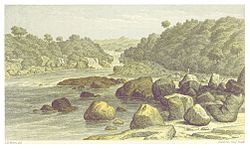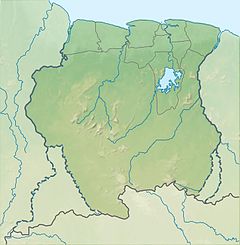Courantyne River
| Courantyne Corentyne, Corantijn | |
|---|---|
 Wonotobo Middle Fall in the Corentyne Basin from Canoe and Camp Life in British Guiana by Charles Barrington Brown | |
| Location | |
| Country | Suriname, Guyana |
| Physical characteristics | |
| Mouth | Atlantic Ocean |
• coordinates | 5°57′N 57°06′W / 5.950°N 57.100°W |
| Length | 724 km (450 mi) |
| Basin size | 69,000 km2 (27,000 sq mi) |
| Discharge | |
| • location | mouth |
| • average | 2,300 m3/s (81,000 cu ft/s) |
The Courantyne River (/ˈkɜːrəntaɪn/ KUR-ən-tyne),[1] also known as Corentyne and Corantijn (Dutch: [ˌkoːrɑnˈtɛin] ), is a river in northern South America in Suriname and Guyana. It is the longest river in the country and creates the border between Suriname and the East Berbice-Corentyne region of Guyana. The length of the river, including the Upper Corantyne River (New River) as it's source river, is approximately 724 km.
Its tributaries include Kutari River, Coeroeni River, New River, and Zombie Creek.[2] In Suriname; Kabalebo River, Lucie River, Sipaliwini River, Kutari River.
Course
[edit]The river runs through the Guianan moist forests ecoregion.[3] It originates in the Acarai Mountains and flows northward via the Upper Courantyne which is the source river for approximately 724 km (450 mi) between Guyana and Suriname, emptying into the Atlantic Ocean near Corriverton, Guyana and Nieuw Nickerie, Suriname. A ferry service operates between these two towns.
Small ocean-going vessels are able to navigate the river for about 120 km (75 mi) to Apura, Suriname.
Waterfalls
[edit]The Wonotobo Falls, Frederik Willem IV (Anora) Falls, and the King Edward VI Falls[4] are on the Courantyne River. Other falls include the Barrington Brown Falls, the Drios Falls and the Maopityan Falls.
Territorial dispute
[edit]Between the upper reaches of the Courantyne, the Upper Courantyne, the Coeroeni and the Koetari rivers lay the controversial Tigri Area claimed by both Suriname and Guyana. The Guyanese–Surinamese border is the Guyanese river bank (the west bank of the river), Suriname regarded the left bank of the Courantyne as a border, but Guyana disputes this and viewed the center of the river as a frontier, based on the Thalweg Doctrine. This conflict, which has been fueled since the colonial era, was solved in 2007 by a verdict by the Hague Arbitration Court, which settles the border between Guyana and Suriname on the left bank of the river, and the river water body belonging to Suriname. The tribunal that defined the maritime boundary between Suriname and Guyana in 2007 confirmed Surinamese sovereignty over the full width of the entire Courantyne River.[5][6] Suriname has control over all ship traffic from the mouth of the Courantyne.
See also
[edit]- Corantijn Basin
- Borders of Suriname
- List of rivers of Guyana
- List of rivers of Suriname
- List of rivers of the Americas by coastline
References
[edit]- ^ "Definition of 'Courantyne'".
- ^ "Zombie Creek, Guyana - Geographical Names, map, geographic coordinates". geographic.org. Retrieved 2021-01-21.
- ^ Schipper, Jan; Teunissen, Pieter; Lim, Burton, Northern South America: Guyana, Suriname, French Guiana, northern Brazil, and eastern Venezuela (NT0125), retrieved 2017-04-03
- ^ "King Edward VIII Falls". World Water Fall Database. Retrieved 16 December 2021.
- ^ Permanent Court of Arbitration - Guyana/Suriname Archived 2013-02-08 at the Wayback Machine
- ^ Award of the Tribunal Archived 2011-01-02 at the Wayback Machine

